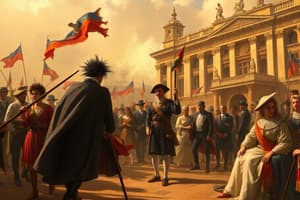Podcast
Questions and Answers
Which of the following best describes the composition of the Third Estate in pre-revolutionary France?
Which of the following best describes the composition of the Third Estate in pre-revolutionary France?
- Mainly nobility concerned about diminishing privileges.
- The vast majority of the population, including peasants and commoners. (correct)
- A coalition of wealthy merchants and industrialists advocating for economic liberalization.
- Primarily clergy members seeking social reform.
How did the heavy taxation in pre-revolutionary France contribute to the unrest among the common people?
How did the heavy taxation in pre-revolutionary France contribute to the unrest among the common people?
- It was fairly distributed across all three estates, leading to economic stability.
- It was used to finance lavish spending by the monarchy and privileged classes. (correct)
- It encouraged agricultural innovation and increased productivity among the peasantry.
- It funded public works projects that disproportionately benefited the nobility.
Why was the Estates General convened by King Louis XVI in 1789?
Why was the Estates General convened by King Louis XVI in 1789?
- To address the economic crisis in France. (correct)
- To celebrate the end of the French Revolution.
- To declare war on neighboring countries.
- To address the growing power of the clergy.
What was the primary reason for the execution of King Louis XVI during the French Revolution?
What was the primary reason for the execution of King Louis XVI during the French Revolution?
Which of the following best characterizes the Reign of Terror during the French Revolution?
Which of the following best characterizes the Reign of Terror during the French Revolution?
How did the principles of liberty, equality, and fraternity impact the post-revolution French identity?
How did the principles of liberty, equality, and fraternity impact the post-revolution French identity?
What role did the Taille play in fueling the French Revolution?
What role did the Taille play in fueling the French Revolution?
How did the French Revolution impact movements for change across the world?
How did the French Revolution impact movements for change across the world?
Flashcards
Three Estates
Three Estates
The division of French society into clergy, nobility, and commoners.
Taille
Taille
A land tax that heavily burdened the common people in France.
Estates General
Estates General
A representative body convened by King Louis XVI to address economic issues.
Reign of Terror
Reign of Terror
Signup and view all the flashcards
Execution of King Louis XVI
Execution of King Louis XVI
Signup and view all the flashcards
Social Inequality
Social Inequality
Signup and view all the flashcards
Consequences of the Revolution
Consequences of the Revolution
Signup and view all the flashcards
Liberty, Equality, Fraternity
Liberty, Equality, Fraternity
Signup and view all the flashcards
Study Notes
The French Revolution: Causes, Events, and Consequences
- The French Revolution was a period of significant political and social change in France, marked by events challenging the existing social order.
The Three Estates
- French society was divided into three estates:
- First Estate: Clergy (Church members)
- Second Estate: Nobility
- Third Estate: Peasants and commoners (vast majority)
Taxation and Unrest
- Heavy taxation, particularly the land tax (Taille), burdened the common people.
- Growing dissatisfaction led to demands for fairer treatment and reforms.
The Estates General
- The Estates General was a representative body of delegates from all three estates.
- It was convened by King Louis XVI in 1789 to address France's economic crisis.
Causes of the Revolution
- Bad Harvests and Rising Prices: Poor harvests led to widespread hardship and food shortages.
- Desire for Social Change: The Third Estate sought equality and an end to the privileges of the nobility and clergy.
- King Louis XVI's Rule: The absolute rule of the King.
Events of the French Revolution
- Execution of King Louis XVI: King Louis XVI was executed by the National Assembly in January 1793 for treason.
The Reign of Terror
- The Jacobins seized power and instituted a period of violent repression known as the Reign of Terror.
Living Conditions Before the Revolution
- Significant disparities between the estates.
- The nobility and clergy were exempt from much taxation, while the commoners faced heavy financial burdens.
Consequences of the Revolution
- Rise of Napoleon Bonaparte.
- Abolition of the monarchy.
- Establishment of principles of liberty, equality, and fraternity.
- Major reshaping of the political and social landscape of France, with inspiration for change around the world.
Studying That Suits You
Use AI to generate personalized quizzes and flashcards to suit your learning preferences.
Related Documents
Description
Explore the French Revolution, its causes, and consequences. Examine the three estates, taxation, and unrest that led to the Estates General. Understand the desire for social change and the impact of bad harvests on the revolution.




